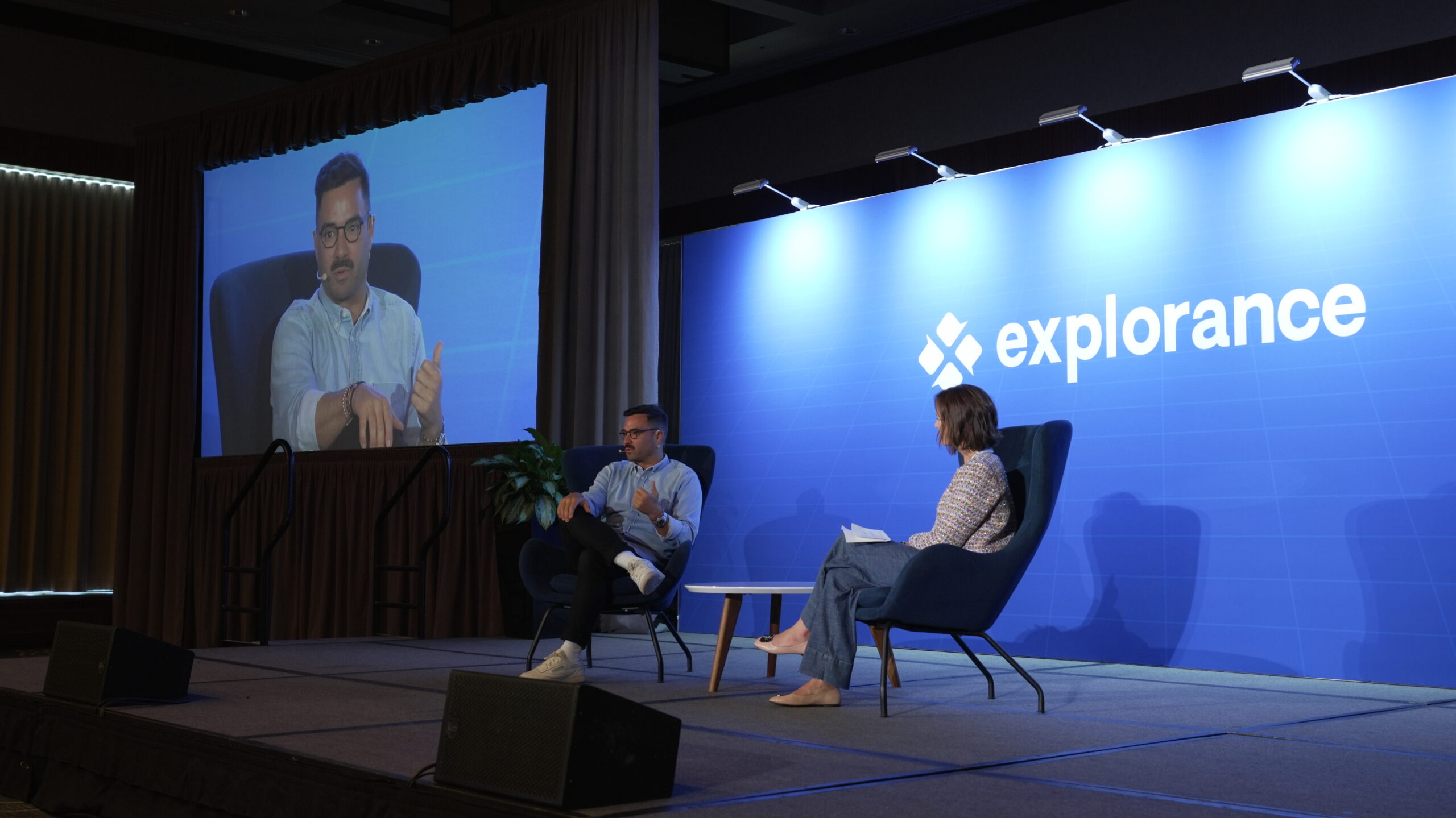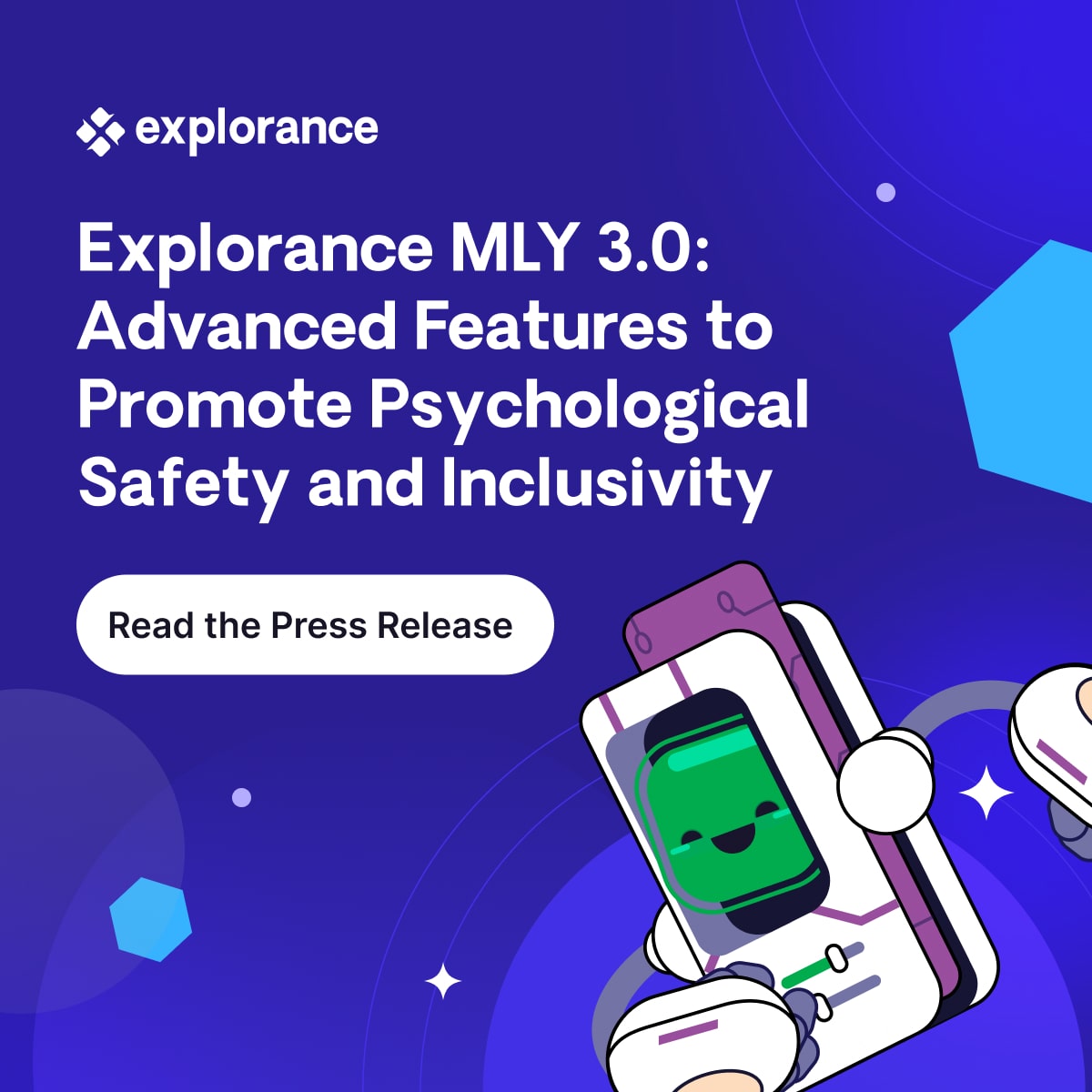Student enrollment and retention are challenges for higher education institutions. As tuition costs rise and student expectations evolve, universities must follow suit and adapt their approach to student success.
According to a recent report, the student persistence rate in 2024 is 76.5%, meaning nearly one in four students dropped out during their degree. This statistic highlights the need for universities to address academic, financial, and social factors that impact student success.
This article explores ten actionable strategies institutions can implement to improve student engagement, provide essential support, and promote a campus environment where students feel valued and empowered to persist in their education.
What is Student Retention, and Why Does It Matter?
Student retention refers to an institution’s ability to keep students enrolled from one academic year to the next until they complete their degrees. It is a key indicator of institutional effectiveness and student satisfaction.
Students who stay in the course of their education have a better chance of achieving academic success and entering the workforce skilled and prepared. Additionally, high retention rates facilitate institutional funding, build a good reputation, and maintain long-term enrollment.
Understanding the factors influencing student retention can help universities introduce proactive initiatives that enhance the student experience and encourage long-term academic success.
The Most Important Factors Influencing Student Retention
Student retention is a complex issue that requires a complete solution. Your institution should anticipate these issues to promote a lasting experience, whether they are academic or integration issues.
Several key elements play a significant role in whether students stay enrolled or drop out of their programs:
- Academic Support: Students need help staying on track academically. They should have access to tutoring, structured academic advising, and relevant faculty members.
- Financial Barriers: Rising tuition costs and limited financial aid can cause students to drop out of their programs. To ensure money is never a barrier to learning, try to have several financing options and as many grants as possible.
- Social Integration: Students who build strong relationships with peers and faculty are likelier to stay engaged in their studies. Create clubs and teams for various hobbies and sports to promote student connections.
- Institutional Culture: A supportive and inclusive campus environment makes students feel valued and motivated to continue. Having a strong identity and student connection to it is a great way to ensure your cohort stays throughout their degree.
By addressing these aspects of student life head-on, institutions can offer a learning environment that prioritizes academic and personal success. Student retention is almost entirely about removing barriers in an already stressful and intimidating time of their lives.
10 Proven Student Retention Strategies You Should Implement
Maintaining healthy student engagement and determination requires a multi-faceted approach. Going too far in one direction might leave certain aspects forgotten. Similarly, certain aspects of student retention will need more than one solution.
Below are ten effective strategies that have been shown to improve retention.
1. Early Academic Intervention Programs
Monitoring student performance and providing targeted interventions can help struggling students before they fall too far behind. Catching this issue early is crucial as bad grades can also have a mental impact that further isolates the student.
Offering proactive academic counseling and tailored resources can improve educational outcomes. A permanent homework help program that students can access at any time of the day is another great initiative in this vein.
2. Mentorship Initiatives
Establishing mentorship programs with faculty, staff, or peers nurtures a sense of belonging and provides valuable guidance. Offering a variety of potential mentors is essential, as students might want different perspectives to navigate their issues.
Regular mentor check-ins can help students navigate academic and personal challenges effectively. An interesting program in this category involves last-year students mentoring freshmen and giving them advice that has led them to success.
3. Financial Aid and Scholarships Support
Expanding access to scholarships and financial literacy programs helps students manage tuition and avoid economic hardship. Higher Education often involves taking loans, and all students should understand precisely what they are getting into.
Universities should proactively communicate funding options to ensure students have the necessary resources. No student should ever find themselves in a situation where they think about dropping out because they can’t afford their tuition anymore.
4. Improved Academic Advising Services
Personalized and accessible advising ensures students can make informed decisions about their degree options and career paths. Students often discover a specialization of branching path that interests them during their degree and should have the resources to explore it.
Regular advising appointments keep students accountable and provide meaningful guidance on course selection. Navigating course offerings can be daunting, but providing a free course path advisory service can alleviate that.
5. Peer Tutoring and Support Groups
Encouraging peer learning through tutoring programs creates a collaborative environment that boosts students’ academic confidence. This program allows students to assess their progress and adjust their learning styles.
Study groups help students strengthen their understanding of course material and build valuable academic relationships. The groups also create a safe environment for students to ask questions and get explanations for their required answers.
6. Campus Engagement Activities
Encouraging student involvement in clubs, events, and leadership opportunities fosters a sense of community. Hobbies and sports are some of the most common ways people make new friends, and higher education is a traditional environment in which to do so.
Engaged students are likelier to remain committed to their education and develop a strong connection to their institution. Making friends in these clubs also helps provide students with additional academic resources by doing school work together.
7. Career Counseling and Development Workshops
Providing career coaching, resume-building assistance, and networking events helps students link coursework and future career goals. Workforce readiness is quickly becoming a top priority for students worldwide.
Institutions that prioritize career readiness increase student motivation and long-term success. If students see a clear and defined path towards their future careers by joining your degree, this program can significantly contribute to improving enrollment as well.
8. Support for At-risk Students
First-generation students, transfer students, and those facing academic difficulties benefit from personalized support programs. Higher education is high-stress, and its mental toll should be underestimated.
Offering dedicated resources such as counseling services and tailored academic planning ensures that at-risk students receive the help they need. These resources should be free and readily available so students feel comfortable using them.
9. Effective Onboarding and Orientation Programs
A strong first-year experience, including engaging orientation programs and freshman success courses, builds a solid foundation for student persistence. Freshmen students should have a lot more direction in the beginning to ensure they remain on track.
Guiding the transition into university increases confidence and prepares students for academic success. The change from high school to higher education is often jarring for most students, especially in the first year, and it’s their institution’s role to cushion their landing.
10. Regular Check-ins and Surveys for Feedback
Institutions should conduct frequent student surveys and one-on-one check-ins to measure student satisfaction and address concerns proactively. Student feedback is by far the best indicator of future student retention rates.
Creating a responsive feedback loop ensures students feel heard and valued, improving their commitment to their institution. A strong student voice is also a powerful precursor to increased student retention.
Case Studies: Universities Excelling in Student Retention
Many universities have implemented these strategies to boost student retention with measurable success. Some examples include:
- University of Newcastle: By utilizing Explorance Blue, the university effectively analyzed student feedback and made data-driven improvements to its academic services.
- American University in Cairo: Their course evaluation system strengthened faculty-student relationships, enhancing student engagement and retention.
- Reykjavík University: Implementing regular feedback surveys allowed the institution to adapt quickly and provide necessary student support.
These case studies demonstrate how proactive retention strategies improve student outcomes and institutional growth.
The Role of Student Feedback Data in Improving Retention Rates
Student feedback is invaluable in identifying challenges and refining retention initiatives. Universities that actively collect and analyze student opinions can tackle any concerns before they escalate.
Explorance Blue provides real-time insights into student satisfaction, allowing universities to make data-driven decisions. Institutions build a culture of trust and engagement on campus by responding to student feedback with tangible improvements.
A commitment to ongoing feedback ensures that universities remain adaptable and responsive to their students’ ever-evolving needs, ultimately driving better retention rates.
Building a Thriving Academic Community
Retaining students goes beyond essential academic performance—it involves fostering a welcoming, inclusive, and supportive environment where students feel encouraged to succeed.
Implementing these ten retention strategies can help universities create an engaged and resilient student body with long-term achievements. Institutions that prioritize personalized support, career readiness, and community-building efforts will have the most significant impact on student persistence.
Higher education leaders must continuously refine their retention strategies to meet the changing needs of students. By focusing on proactive solutions and meaningful student connections, universities can build a thriving academic community that supports long-term success.
To explore advanced student retention solutions, visit Explorance’s website and schedule a consultation today.
Montreal, Quebec – September 5, 2024 – Explorance, the leading provider of Feedback Analytics Solutions, will sponsor and attend the QSN 17th Annual Conference on September 12-13 2024, in Birmingham, UK.
Set to take place at the Aston Business School Conference Centre, Explorance is looking forward to connecting with higher education leaders at stand #3 to exchange insights and strategies on optimizing quality assurance and enhancing the student experience. Be sure to stop by and chat with:
- John Atherton – VP Sales, EMEA;
- Matt Claridge – Account Manager;
- Marc Deboeck – Sales Development Representative.
Don’t miss the opportunity to learn about Explorance MLY, our AI-powered solution that amplifies the student voice by efficiently collecting, analyzing, and sharing feedback with stakeholders.
About QSN
QSN is a membership organization for individuals who manage the quality and academic standards of higher education institutions in the UK. Providing an outlet for higher education professionals to discuss key issues relating to quality management and enhancement, QSN organizes an annual conference and smaller symposium events to discuss various topics of interest. For more information, visit qualitystrategynetwork.org.uk.
About Explorance
Explorance empowers organizations with next-generation feedback analytics to accelerate the insight-to-action cycle, encouraging the philosophy of “Feedback for the brave” to drive purpose, impact, and growth.
Bringing 20 years of expertise, Explorance, a member of the World Economic Forum and a trusted partner for 25% of Fortune 100 companies and 35% of the world’s top higher education institutions, has influenced over 25 million individuals with award-winning solutions like Blue, Metrics That Matter, and MLY.
Consistently among the top employers by the Great Places to Work Institute®, Explorance, a Brandon Hall AI award winner, is also a two-time Global Leader in the 360-degree feedback market by Fortune Business Insights.
Visit explorance.com or connect on LinkedIn, Facebook, and Twitter.
Contact
Sandrine Thiboutot
Marketing Content Specialist
It’s hard to believe that 10 years ago, we opened registration for the first Bluenotes conference – then called Bluenotes Americas – and started an exhilarating journey that continues to impact Higher Education across the globe. Hosted by the University of Louisville and sponsored by Explorance, the 10th annual Bluenotes GLOBAL 2023 took place in Kentucky from July 30 – August 3, 2023.
Since we started our work in 2013, we’ve had one overarching goal: To support Explorance Blue users by providing them with a community where they can connect to share successes, lessons learned and discuss new ideas for innovative problem-solving.
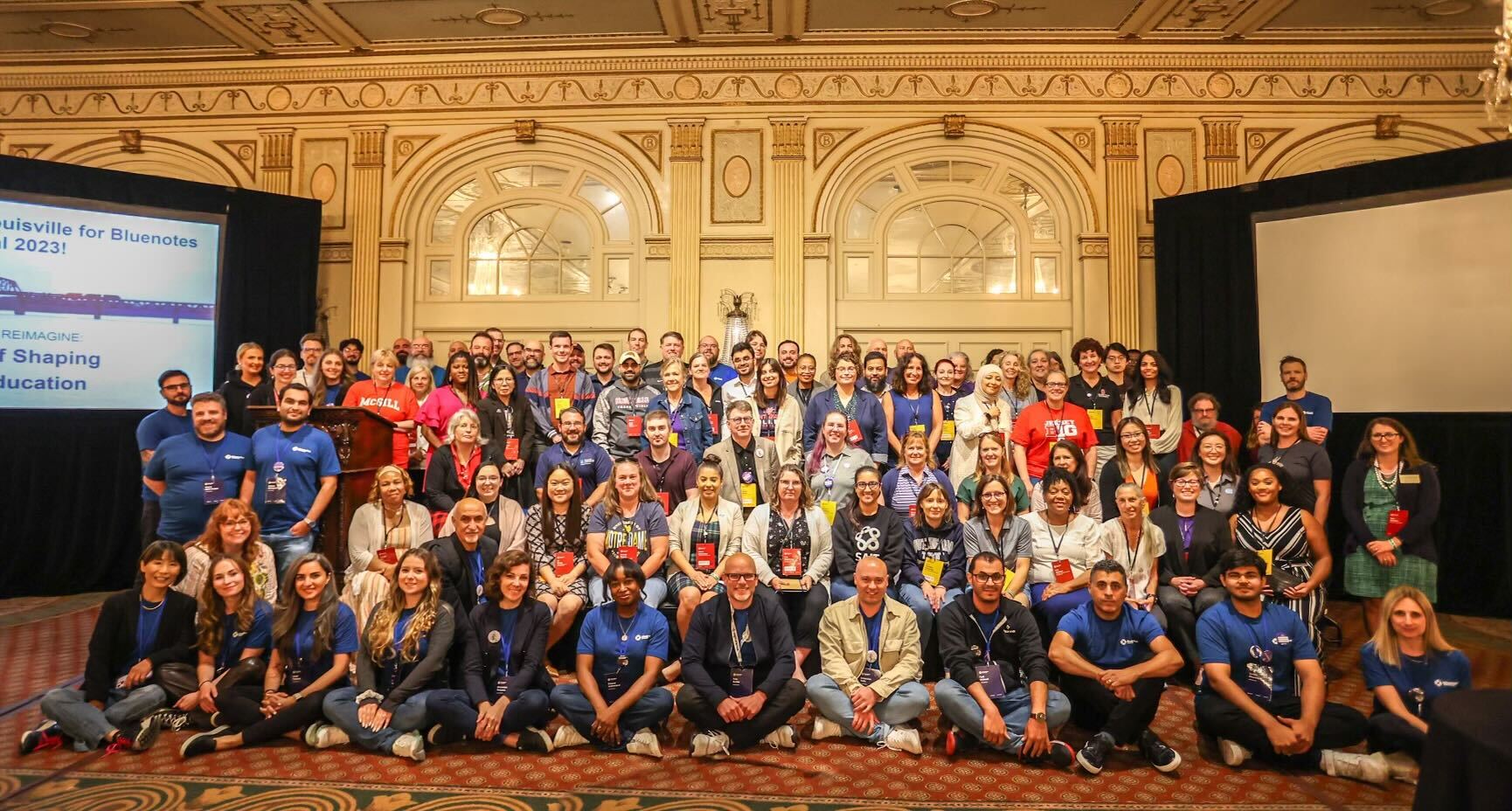
This year’s conference theme, “Reflect and Reimagine: 10 Years of Shaping Higher Education,” presented an opportunity for Explorance to engage our Higher Education customers in crafting the next partnership phase as we all pursue our shared mission: improving teaching effectiveness and enhancing the student learning experience.
Here are 10 lessons learned at the 10th Bluenotes GLOBAL conference:
1. 10 Years of Milestones to Celebrate
The Bluenotes Community had so much to celebrate this year! We took time during the conference to recognize and celebrate a few of the milestones accomplished during the past 10 years as a community.
- Perfect Attendance: Honoring those attendees who have joined us for every Bluenotes GLOBAL conference.
- Most Certified: Honoring the institutions with the most certified Explorance Blue users.
- Agents of Change: Honoring the top three institutions who have influenced the roadmap of Explorance Blue during the past 10 years.
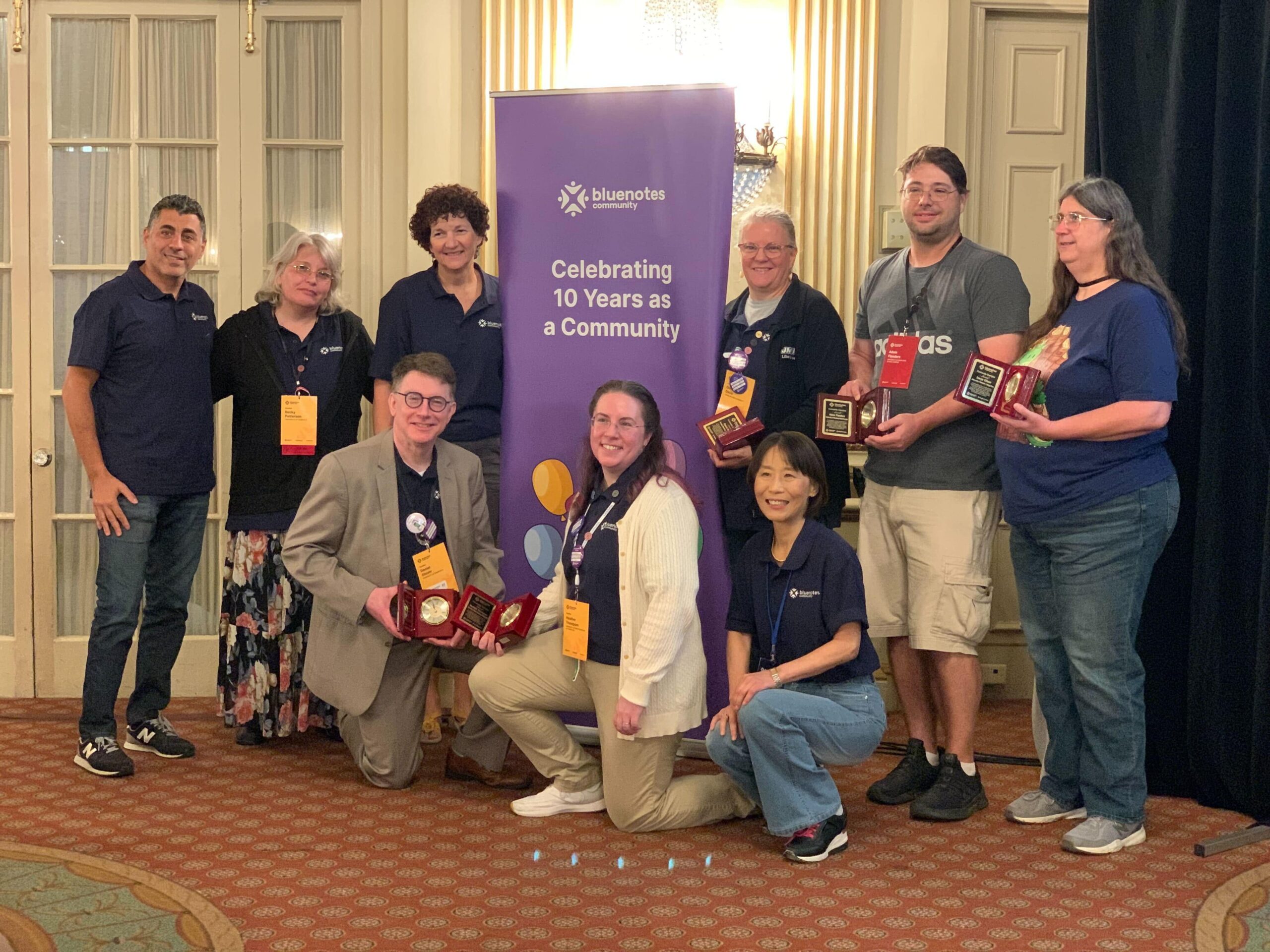
2. Student Feedback is Still a Marker for Student Success
One of the benefits of the Bluenotes community is that it allows Explorance Blue users to share a common interest in a mission that the community focuses on. This year, like the last 10, saw leaders recommitting to student feedback data as a mode to navigate the accelerated transformations within Higher Education. Whether through university-led presentations or panel discussions, the conference was packed with insights and lessons from peer-to-peer experience around their use of student feedback.
“One of the most consistent data you can collect every year in every term is course evaluations,” shared Taiwo Ande, Senior Associate Provost, California Lutheran University, during the day two panel discussion. “Course evaluations provide one of the most easily accessible information you can have to drive curriculum and program improvement.”
Co-presented by California Lutheran University, Dalhousie University, and Saint Mary’s College of California, this panel focused on how effectively Higher Education institutions used feedback gathered through Student Evaluations of Teaching (SET) to help improve curriculum reviews and program development processes.
3. Feedback is a Loop, not a Line
A common thread in most presentations was that feedback is not a linear process. Rather it operates as a continuous loop that cycles between students and educators. This dynamic loop entails an ongoing exchange of insights, opinions, and observations, where students provide their perspectives on the academic experience, and educators respond by adapting their methods accordingly.
During her session, invited speaker Gail DePuy, Ph.D., Senior Vice Provost at the University of Louisville, revealed, “Our student government association is in the room when decisions are being made, informing students of what’s happening behind the scenes and proving we are working on improvements based on their feedback.”
This iterative nature of feedback acknowledges the evolving nature of education and the diverse needs of students. It emphasizes the importance of consistent communication and mutual adaptation, fostering an environment where learning is a collaborative endeavor rather than a one-way street.
“We also encourage faculty to explain how they use feedback data for instructional changes,” added Robert Goldstein, Vice Provost, Assessment and University Decision Support/Analytics, University of Louisville. “When faculty takes the time to explain how they incorporate student feedback data into instructional changes, they get the best results [on SETS].”
4. Course Evaluations are one Part of the Equation
To truly understand the intricacies of student learning and teaching effectiveness, many Bluenotes Community members are adopting a holistic feedback approach that goes beyond course evaluations. It includes avenues for gathering feedback on various aspects inside and outside the classroom.
A holistic feedback approach includes the learning environment, support services, assessment methods, curriculum relevance, and overall educational climate.
- Peer Reviews
- Self-Evaluations
- Midterm Reviews
- 360 Degree Feedback
- Alumni Surveys
Moreover, holistic feedback incorporates qualitative methods to dig deeper into open-ended comments where students articulate their experiences in greater detail.
5. Everyone Wanted to #MeetMLY –The AI-Powered Student Voice
As comment analysis and AI were at the forefront of discussions at the Bluenotes GLOBAL 2023 conference, Explorance revealed MLY, a specialized comment analysis solution that accurately consumes, analyzes, and categorizes up to 1 million student comments in 1 hour. Explorance MLY captured attendees’ imaginations at the MLY zone – where visitors were treated to customized MLY buttons and product demonstrations – and during various presentations from Explorance staff and faculty grant researchers. As we continue to explore the transformative potential of student comment data, we hope to partner with the Bluenotes Community to shape product development to meet their needs.
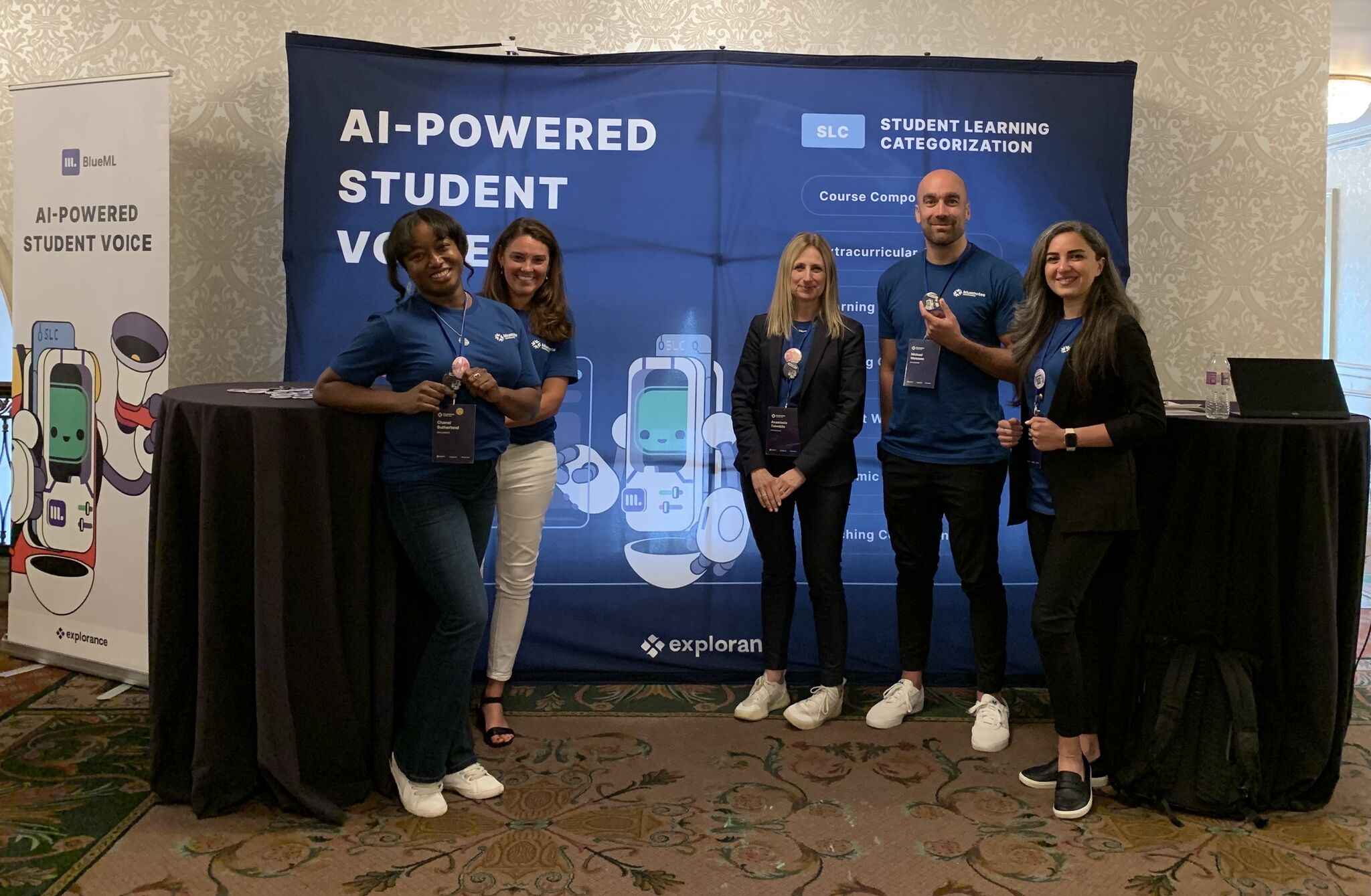
6. Always Build with Flexibility and People in Mind
In their presentation “Take a Chance on Me – Taking Chances and Doing Things Differently,” Tufts University and The Ohio State University presenters demonstrated why software flexibility is not just a convenience but a strategic necessity. Two distinctly different institutions, each leveraging the flexibility of Explorance Blue to mitigate complicated evaluation situations.
The Ohio State University has 65,000 students across campus and 40,000 employees. Every division uses the same 10-question Student Evaluation of Teaching questionnaire. On the other hand, Tufts University has 6,000 undergrads, 6,000 graduates, and 6,000 faculty, staff, and clinicians.
“I would love to do everything one way, the same way [as The Ohio State University], but all our schools use Explorance Blue differently,” commented Candace Girard from Tufts. “We are on the same Blue instance, but they all have special needs. Over half of our schools are health sciences which adds a whole other level of complications. But this also gives us the opportunity to think outside the box.”
7. Community is a Worthwhile Commitment
The Bluenotes Community is, first and foremost, for Explorance Blue users, and over the last 10 years, we have seen just how much value they have got out of it. From forming regional chapters and communities of interest to collaborating on forum discussions, webinars, and conferences, the community has become an organic entity that supports anyone using the Explorance Blue suite of Feedback Analytics products. It also acts as a driving force for product improvements to ensure that, as a company, we are constantly building software that better meets our customers’ needs.
As Boston University joins the Blue family, Kevin Wiles, Educational Platform Administrator, said: “As a university in the middle of implementing Blue, Bluenotes GLOBAL 2023 was an amazing way to welcome BU into the Blue family. Not only did we learn about relevant technical and operational pieces of Blue, but we created meaningful connections with people from our peer institutions, from those who have been using Blue for a decade to those like us who are building new relationships with Explorance. The appreciation shown to their clients lets us know that we chose the right product for our needs and the right company to stand behind it.”
8. Support Services Should always be the Top Priority
Imagine a place where attendees’ questions find swift answers, concerns are met with understanding, and technical glitches are resolved before they can cast a shadow on the event. The Explorance Support Station at Bluenotes GLOBAL was not just a help desk but a sanctuary of support and solutions for those attending the conference. It embodied the commitment to our customer’s success. It showcases that our organization is dedicated to presenting groundbreaking solutions and ensuring that each Explorance Blue user maximizes their potential with our products.
9. Fostering Connections Beyond the Conference
Beyond the workshops, presentations, and demos lies an essential dimension that brought that extra life into the Bluenotes GLOBAL conference—the networking events. These gatherings weren’t just about mingling; they were about cultivating relationships, sparking collaborations, and amplifying the impact of the conference experience. We started this year’s conference with a welcome reception at The Brown Hotel Rooftop, where we met and mingled before the official conference opening.
In addition, we had structured networking that brought together Explorance Blue users from different institutions to have purposeful conversations on a specific topic relating to student feedback. These structured sessions helped bridge the gap between different personalities, titles, and institution types and between newcomers and veterans. We hope to weave a tapestry of shared experiences and successes by facilitating these connections.
10. Everyone’s Excited About the 2024 Conference
We told our customers at Bluenotes GLOBAL 2023, and now we’re ready to tell the world. Where will our 2024 conference take place? What will it be called? Watch the following video and find out.
Are you interested in reserving a spot or getting more information? Feel free to contact us.
The Student Voices in Higher Education Conference, which Explorance hosted in the UK in May, created a unique space for universities to share knowledge, experiences, best practices, insight, and lessons learned about their student voice initiatives.
The conference aimed to address the question: How are universities using student surveys to deliver teaching and learning outcomes? Explorance was delighted to welcome around 80 delegates at Conference Aston in Birmingham.
Academics, professional staff, and student representatives benefited from 12 university-led sessions, three panel discussions, two keynote speakers, and two Explorance-led sessions. These included senior HE sector representatives from Advance HE, Quality Assurance Agency for Higher Education (QAA), and Universities UK.
10 things we learned at the Student Voices Conference
1. Students value the opportunity to be heard
The opportunity to have their voices heard is essential to students. The day one keynote speaker, Jonathan Neves, Head of Business Intelligence and Surveys at Advance HE, revealed that national surveys show that 8 out of 10 students are satisfied with their experience in what is perceived as a consumer environment where they can be relatively critical of the value they receive. He explained that meeting or exceeding expectations can be challenging when the student experience can be inherently daunting, and levels of student well-being remain well below the general population.
2. Why representing student voices matters
Students and Higher Education Institutions have recently faced three significant challenges: Covid-19, strike action, and the cost-of-living crisis. All of these have impacted the student experience. With students attending university less frequently and considering more fundamental changes to their studies, Neves explained that this would likely affect broader perceptions (as campus life is a crucial factor in the student experience). Lower attendance and participation among some cohorts will likely impact the sense of belonging. However, many students recognise Higher Education as a transformational experience, and a commitment from universities to represent the student voice in surveys will help to maximise this.
3. “Strategic and authentic” institutional mission
The day two keynote speaker Professor Ruth Ayres, Pro Vice-Chancellor Education at Aston University, reflected on moving from “the customer-consumer relationship to how we work with students to co-create.” She asked delegates to rate their success using student voice activities such as national surveys, Module Evaluation Questionnaires (MEQs), and end-of-program surveys. These methods aside, at the heart of Aston’s story is a “strategic and authentic commitment” by the University to making a difference through student voices and evidencing when and where student feedback has impacted institutional decisions, projects, and initiatives. Attendees also learned how the University of Sussex had developed a holistic approach to capturing data through the student journey as part of its student voice strategy.
4. Adopting ‘student as partner’ approaches
Universities are increasingly taking an approach to the co-development of student voice activities in partnership with their Student Unions, as discussed in the Leaders’ Forum titled: How Can We Ensure That Student Voice Supports Continuous Improvements in Our Institutions? Embedding student voices in decision-making projects which impact the student experience and offering different forums through which students can engage, digital and in person, were overarching principles cited. Just as important were co-designing and co-creating projects (ranging from education strategy to curricular and learning spaces) and facilitating the journey from student feedback to genuine student voice.
5. Engaging the full diversity of learners
While universities are committed to ensuring student voices are heard and represented, specific groups (including mature students, commuter students, and degree apprenticeship students) remain disproportionately challenging to engage in student voice activity. In the Students’ Forum, Is Our Feedback Being Listened To and Acted On?, Yemi Gbajobi, Chief Executive of the Arts Students’ Union at the University of the Arts London, argued that these groups of students are not “hard to reach.” Universities must find out the best way to get to them. Targeted surveys or other focused student voice activities were some of the solutions presented by institutions.
6. More data analysis of existing surveys
The Students’ Forum explored the issue of survey fatigue. Student Union representatives on the panel agreed that students are ‘over-surveyed,’ and a discussion followed on what could practically be done to mitigate this. “We don’t need more surveys; we need to spend more time analysing the feedback we’ve got” was a collective view expressed. What was suggested was a more significant analysis of quantitative and qualitative feedback. University presentations also alluded to the fact that data analysis was the most complex/time-intensive aspect of surveys, both in terms of the number of surveys to process and in understanding themes arising. Explorance MLY can help transform student comments into actionable insights on specific themes with Machine Learning.
7. Prioritise actions, manage expectations
“Students tell you various things in feedback, and you must take it seriously.” This quote is taken from a presentation by Cardiff University. A representative from the University detailed how following an £8 million investment in the student experience, supported by the University’s Pro Vice-Chancellor Education and Students, a ‘trial and error’ approach to enhancing the way they work with students has been underway. However, while recognising that having given their feedback, students want to know what their institution will do about it, meeting/managing expectations and identifying actions to take in follow-up was an essential next step. “You can’t do everything at once, so it’s how you prioritise,” said the presenters.
8. “I’ve given my feedback. Now what?”
Closing the feedback loop has been the biggest challenge for universities in my own experience in course evaluation surveys for the past ten years and more. It came out organically in a number of university-led presentations as well as in the Students’ Forum. Fundamentally, students do not always feel that their feedback is being acted on (that “no one is listening”) and that they will not benefit from giving feedback. Pulse and mid-term surveys are a nod to the need to make changes that impact students currently in session. But being effective and agile and closing the loop at a local level is a must.
9. Increasing response rates is still a priority
Every university seeks to increase its survey response rates, primarily from its internal baseline. Students suggested that one of the reasons for low response rates is that they need help prioritising which surveys to respond to. That there is also a need to decide which surveys are most impactful to “reduce the noise” was suggested by Cardiff University. Institutions that have implemented Student Champion or Student Ambassador initiatives revealed that they are among their most successful student voice mechanisms, through which encouraging survey completion may be one task.
10. Professional development for individual instructors
Last, what about institutions working with Explorance for many years? How do they keep innovating? In 2023 Durham University renewed Explorance Blue for another five years. It is now developing a new Evaluation Excellence toolkit for every new faculty member. This includes student feedback – contextual Module Evaluation Questionnaires (MEQs), in-class feedback, student-led interviews, focus groups – and other sources. With the MEQs, the module leader writes a reflection piece, based on their scores, on how the module went and an action plan for improvements. This speaks to the broader development piece on how instructors engage with students to improve their teaching.
In summary, end-of-module and mid-module evaluation surveys remain a hugely valuable component for capturing student feedback and are here to stay. However, universities are now deploying surveys around teaching effectiveness, learning excellence, staff engagement, and student experience. One example is Student 360s, where universities examine student competencies and workforce readiness. It will be interesting to see how these develop between now and next year’s second edition of the Explorance Student Voices Conference.
Montreal, Canada – February 6, 2023 – Explorance and the Bluenotes Community are delighted to announce the recipients of this year’s Faculty Research Grant.
It is part of Explorance’s commitment to help Higher Education institutions and researchers enhance teaching effectiveness and student experience by leveraging actionable insight to drive student success.
The 2023 Faculty Research Grant Review Committee and Explorance would like to thank the Bluenotes Community and their institutions for their participation in the 2023 Explorance Faculty Research Grants.
Explorance’s Chief Community Engagement Officer Yeona Jang spoke about the grant review process for this year:
“On behalf of Explorance, I would like to express our gratitude to all researchers in the Bluenotes Community who applied for our 2023 Explorance Faculty Research Grants to advance the research on teaching effectiveness and student success with use of evaluation and assessment data. We also want to thank Robert Goldstein, Vice Provost in the University of Louisville & the chair of the review committee, and the review committee members for their dedication and hard work in carrying out the rigorous double-anonymous review process. I’m excited to learn about these research projects in-person at the Bluenotes GLOBAL 2023 Conference where the Bluenotes Community institutions are coming together to celebrate its 10th anniversary as a community.”
Alison Gibbs, Professor & Director of the Centre for Teaching Support & Innovation of the University of Toronto commented on the institution being selected for this year’s grant:
“With this grant, we will be engaging students as partners in a study to better understand the student perspective. We are excited about the impact we expect this work to have and the opportunity to share our findings at Bluenotes. Thank you for your support in making this possible!”
View the Recipients of This Year’s Faculty Research Grant Here
Selecting This Year’s Recipients
The 2023 Faculty Grant Review Committee received a large number of applications from Bluenotes Community institutions worldwide.
A double-anonymous review process was administered and coordinated by the University of Louisville. Explorance anonymized each research grant application for review upon receipt by at least two members of our 31-person committee, comprised of faculty and administrators from Higher-Education institutions in the Bluenotes Community from around the world.
Explorance has committed a total of about $100,000 USD to be awarded to the Faculty Grant recipients.
Learn About the Research Findings
Research findings will be presented at the Bluenotes GLOBAL 2023 conference to be held in Louisville, KY from July 30 through August 2, 2023, at the University of Louisville. Participants of Bluenotes GLOBAL 2023 will be able to connect and share insights, best practices, and experiences in using feedback to enhance teaching effectiveness and foster student success, while celebrating 10 years as a Community.
Register now and lock-in early-bird pricing to make the most of four experience-rich days of knowledge sharing, learning, networking and professional development.
Let’s start the improvement journey together.



